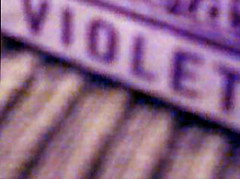Sarah Ruhl. Eurydice. Circle X Theatre Company. 12/17/06.
I saw this one weeks ago at this point, but it's still playing, so you can check it out still at least. I was conflicted about Eurydice, which I suppose is why it took me so long to write about it. Charles McNulty of the LA Times listed it as one of his best of 2006, but I'm much more reserved about it. I do believe it is well-written - Ruhl's use of language is evokative and skillful. I absolutely loved the teal tile of Brian Sidney Bembridge's set. Kelly Brady as Euridyce is a striking and powerful actress. But, honestly, I was hoping for more from Ruhl than a beautiful play.
In once sense, Eurydice is strikingly anti-feminist and that really bothers me. It's all about a girl passing from the house of her father to the house of her husband and her refusal to grow up. The main premise is that a wedding is the moment in which a girl leaves her father and marries her husband - there are no other options for her. My problem with it is that Eurydice sometimes seems rather than the active main character of the play a passive absent center. She refuses to grow and instead chooses childhood and forgetting in the arms of her father - she doesn't reject the idea that she must choose between father and husband and learn to stand on her own as I would like her to do. The play starts out so hopefully as a recentering of the Orpheus myth to focus on the woman neglected in the story of a great mythical musician, and I still believe there's a lot of potential in this story, but in many ways that's not what Ruhl is trying to do. She's using the myth to tell her own story, and her own personal conflict, which is fine and in many ways beautiful, but for one of the few plays out there by women and one of the few women playwrights to get national attention, I think it's kind of tragic that the mindset of this play is so regressive.
The husband, an Orpheus played by Tim Wright, is part Greek poet and part urban hipster rocker, but sometimes treats Eurydice as a child and certainly denigrates her bookish intelligence. Personally, I was terribly conflicted about whether he was horrible to her and she was better off dead or if he was sweet and learning to respect her, which is part of what makes this play so complex and forces me to fight my tendency to dismiss it. The relationship between the two of them is interesting and complex and conflicted and gives a lot of depth to the play.
Is it fair of me to fault her for not telling the story I'd like to hear? Perhaps not, but I do wish it had been different. Frank' Wild Lunch attributes the feeling of this play being not quite right or not quite satisfying to modernity and his own detachment, aserting that "I feel like it wants to be a deeply felt examination of grieving, and I should be a puddle of tears by the time the show's over, like the puddles of water all over the stage," but I don't think it really wanted to be about grieving at all. I saw it as an examination of growth and maturity and death and the futility of resistance of each of these. I felt there was more resignation and melancholy than real grief in the play and that in itself is frustrating.
I Interview Playwrights Part 1124: Sophie McIntosh
-
*photo by **Nina Goodheart*
Sophie McIntosh
*Hometown:* Sun Prairie, Wisconsin!
*Current Town:* Brooklyn.
*Q: What are you working on now?*
A: I’m ...
3 weeks ago

1 comments:
Good points!
Post a Comment